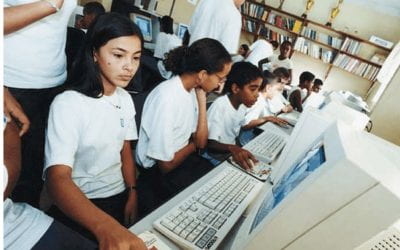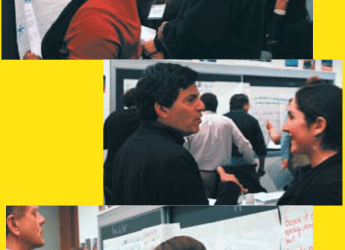Using Dance to Set and Achieve Goals in a Favela
Less than three weeks into my year-long fellowship in Brazil, I wrote in my journal one morning: “The violence is intimidating and saddening… it’s quite debilitating and last night it led to a feeling of entrapment that was so powerful… I certainly understand why these kids yearn for a place to be free of fear, to be happy and loving, to be able to have faith… to not have to fiercely guard their vulnerability, their humanity.”
I was writing that morning about the kids of Espaço Aberto, a community group that teaches dance in the favela of Rocinha. Its population, estimated anywhere from 150,000 to 250,000, has earned it the popular title of the largest shantytown in Rio de Janeiro, and possibly all of Latin America. I was writing about children like Jeferson.
Jeferson is a reserved and handsome 17 year-old man; a talented capoeirista (a kind of Brazilian martial art) and dancer who has been with “Espaço Aberto” for a mere two years. Despite his short time with the group, his talent and dedication have earned him a small monthly stipend to take ballroom dance classes in the center of Rio.
Jeferson, who at one point dropped out of high school to help support his mother and four younger siblings, has now returned to school. He is determined to grow as a student, as he has grown as a dancer and as a young man. When I asked him why dance has made him a more focused student, Jeferson responded, “If I want to train hard to become a good dance teacher one day, then I should train to read and write well just like any teacher would.”
As with Jeferson, I have seen how dance has taught the other children of Espaço Aberto the value of goal-setting and determination. With two fully formed ballerinas and several small scholarships for dance academies outside of the favela, the students of Espaço Aberto have shown me the power of dance to develop impoverished youth into self-motivated and responsible citizens.
While such values of integrity and perseverance are important for the development of conscious and productive citizens anywhere, I find this to be especially true in Rocinha. In such a marginalized community, where poverty and the constant threat of violence limit children to their day-to-day survival needs, the power of dance to provide a future orientation for these children is invaluable.
I concluded my journal entry that morning with a small but sincere wish to not have to spend my time in Brazil on a guarded fellowship experience, restrained by the threat of violence. I wrote, “I hope I get to revel in my humanity… dance, smile, be free.” Indeed, the students and the teachers of Espaço Aberto have shown me that in creating a space for dance, they have created a limitless, “open space” for dreams, for happiness, and for the freedom to grow.
Spring 2007, Volume VI, Number 3
Jennifer N. Wynn is a Sociology graduate of Harvard College and a 2006-2007 Michael C. Rockefeller Fellow. She is currently exploring the power of dance in the favelas of Rio de Janeiro, Brazil, and can be reached at wynn@fas.harvard.edu.
Related Articles
Becoming Brazuca? A Tale of Two Teens
Prior to arriving in the boston area almost five years ago, I had heard anecdotally that a significant Brazilian immigrant population had been arriving en masse to the region since…
Education: The Role of the Private Sector
I remember walking into the room for my last interview for the scholarship from Fundação Estudar. As soon as the other five candidates and I found our assigned seats, we realized that our…
Biomedical Spending
I have traveled a lot in recent months, from Phoenix and Salt Lake City to Budapest and Amsterdam. I even purchased a world map, one of those for putting up on your wall…




